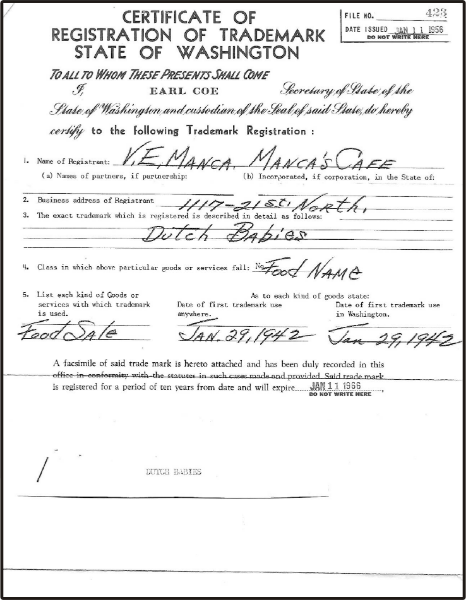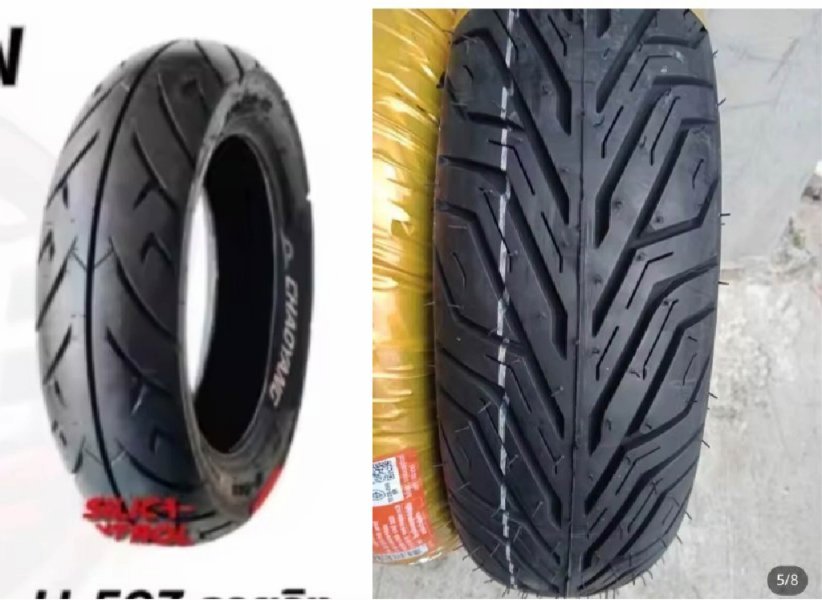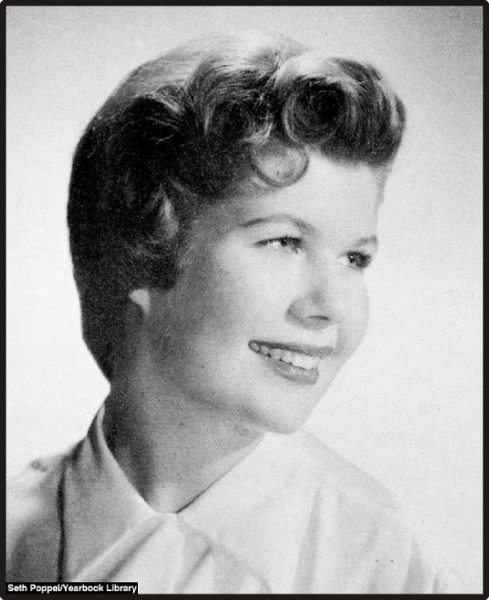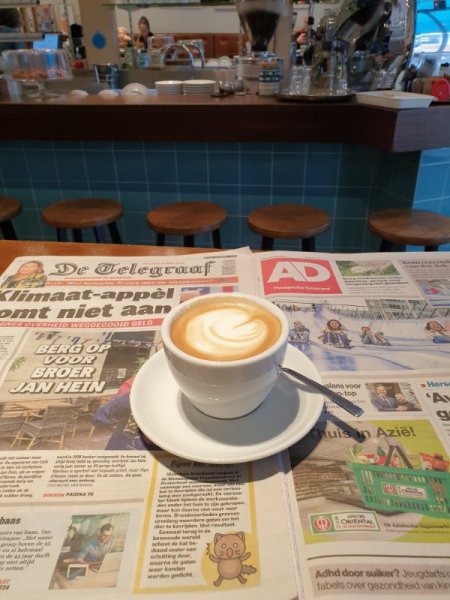-
Posts
502 -
Joined
-
Last visited
Content Type
Events
Forums
Downloads
Quizzes
Gallery
Blogs
Everything posted by jacnl2000
-

Donald Trump Seems A Sure Thing For a Nobel Peace Prize!
jacnl2000 replied to BangkokReady's topic in Political Soapbox
Appreciate satire. 😄 As for the Nobel Peace Prize — Trump hasn’t won it, but he has been nominated several times, mostly by political allies. Will he win? Hard to say. It’s theoretically possible — if he somehow ends a war or pulls off a major peace deal. But let’s be honest: he’s unlikely to sweep the Nobel categories. Economics? His trade wars and ballooning debt don’t exactly scream Stockholm. Chemistry? Unless he formulates a miracle hair product, unlikely. So yes — Peace is the only plausible one. And even that’s a big maybe. -
Happen to carry around a very different image of Dutch pancakes in my mind. Miss my pancakes too. Did not see the relative smaller versions during my latest Hotel visit in Udon Thani. In my dialect they are called struif, but look very different than the one in the picture above. The dish in this photo (the oven-puffed kind) is called Dutch Baby as a trade name, coined in America, most likely in the 1920s at Manca’s Café. There's absolutely nothing Dutch about them, but appreciate the pun intended 🙂 In many Dutch dialects, struif (pannekoek) refers to a kind of light, airy pancake — often pan-fried, not baked, and usually thinner than the puffed-up Dutch Baby. It's homely, straightforward, and deeply local — quite different from the theatrical American version: (previous post did not succeed)
-
Documentation proving the country of manufacture of a guitar is the key that unlocks any FTA benefits. So, when your Irish friend plays on a Japan-made Fender and provides the proper proof of origin, he’ll only have to pay 7% VAT — no import duty applies. However, if he plays on a USA-made Fender, he’ll face an additional 10% import duty, regardless of his passport — and even after the EU–Thailand FTA is signed (expected by the end of 2025), because the FTA only applies to EU-origin goods, not U.S.-made instruments.
-
https://www.reuters.com/markets/deals/thailand-sign-agreement-with-european-free-trade-association-next-week-pm-says-2025-01-13/ There’s currently no trade deal between the UK and Thailand, so once your guitar lands, you’ll also need to pay around 17% in taxes (that’s 10% import duty + 7% VAT) based on its value—before you can get your hands on it and play.
-
“Grasshopper” was indeed the iconic nickname whispered to Kwai Chang in the quiet halls of a Shaolin temple. Then there’s ตั๊กแตน ชลดา (Takkatan Chollada), whose name starts with ตั๊กแตน—the Thai word for grasshopper. She’s changed over the years, still vibrant, maybe a little fuller, but her voice still leaps where it matters most. Her next performance is set for the 21st of September in London.
-
-

Motorcycle tyres - any advice please (bad roads)
jacnl2000 replied to Martinpeter's topic in Motorcycles in Thailand
You’re absolutely right. The standard Honda Moove in Thailand almost always comes with 12-inch wheels, and that’s the model most riders are familiar with. The 14-inch NFC110BTF “Moove 14” variant is quite niche and not officially common in the Thai market. This raises an alarm bell inside myself. Given that, it’s safest to: Stick as close as possible to the original tire specs that Honda specified for the exact model OP has (the Moove 14-inch NFC110BTF ?) Avoid mixing tires or sizes outside manufacturer recommendations, because even small changes in tire diameter, profile, or tread can cause handling quirks or instability—especially on a scooter where front-end feedback is critical. For the NFC110BTF 14-inch Moove variant, the original front tire is typically 70/90-14, usually from a Honda-approved brand or model. If you want to be sure about the exact OEM tire specs, I agree: the best move is to consult Honda Thailand’s official parts or service department. They can confirm the recommended tires or offer genuine replacements built for that specific model and its handling characteristics. Most cautious approach — throwing the question back to Honda and sticking to OEM tires — is the most responsible advice, especially for a less common model like the Moove 14-inch NFC110BTF. I learned the hard way what happened when I started to customize parts of my bike: my bike started to tremble and resonate at specific speeds. Try to maintain balance and stability. Test ride after each change and trust your gut: even if it looks “cool,” if it doesn’t ride right, it’s not right. No idea what happened to the bike of OP. Return to OEM geometry: tires, forks, brakes — the closer to stock, the better. -

Motorcycle tyres - any advice please (bad roads)
jacnl2000 replied to Martinpeter's topic in Motorcycles in Thailand
OP showed following two pictures: Front Tire: ✅ Use the left one (in the photo) – it’s stable, safe, and performs better on Thai surfaces. Rear Tire: ⚠️ The right one is acceptable only if you have no better option. ✅ Better alternatives: Chaoyang H569 Vee Rubber VRM-134 These provide stronger grip, braking confidence, and durability for Thai road conditions. Still wobbly or shaky at the front? 👉 Get a mechanic to check the front tire, wheel, suspension, or handlebar — the issue might not be the tire alone. That takes me back to long rides I used to take about thirty years ago on my 1400 cc chopper, traveling from the South of the Netherlands to our annual Motortreffen in Klagenfurt, Austria, crossing the Swiss Alps. The final mile home was always the trickiest, especially when rain hit — the rear tire’s tread wore down quickly, making it especially risky. -
+1 🛕 Wat Phra That Phanom (Nakhon Phanom) is said to be the spiritual heart of Isaan. Visiting once in a lifetime is believed to bring blessings of peace and good health. It's not just a temple — it's a moment of stillness on your road trip. Time your visit for sunset, when golden light touches the stupa and incense trails drift in the breeze. 🌿 Behind the temple lies a kind of living pharmacy — over 1,000 species of Thai medicinal herbs, including rare and endangered varieties. Each plant is labeled with its name and traditional uses, from fever relief to digestion to spiritual cleansing. The garden also serves as a learning center for monks and students of Thai traditional medicine. 🧘♂️ But it’s more than a classroom. It’s designed for quiet walks and reflection — shaded paths, butterflies, and the scent of lemongrass, turmeric, and holy basil rising through the air. If only there were more time to linger. 🍽️ For a peaceful lunch nearby, head to Lomyen Garden Restaurant (ลมเย็น การ์เด้น) — just 3–5 minutes from the temple, offering gentle Thai-Isaan flavors and garden seating. Or wander a little farther south to The Moon Café, a riverside spot perfect for a slow sandwich, local dessert, and a view across the Mekong. 🔍 Since true philosophers of science do not tend to trust their own writings, please check reviews on major platforms before believing what I’ve written here above. It could be more than poetry — or it could just be good business talk.
-

Report Thai-Cambodian Leaders Engage in Peace Talks Over Border Dispute
jacnl2000 replied to snoop1130's topic in Thailand News
Promising signs for the people of Isaan—stability at the border is always welcome. Yesterday I had to head out to customs near the border in Nakhon Phanom. I found a moment of calm watching the water buffalo do what they do best—grazing peacefully, while their owners stood quietly under their umbrellas, keeping an eye on them. That said, we’ve seen diplomatic gestures before that didn’t lead to real change. The reality on the ground tends to get shakier once international courts get involved. Let’s hope this stays at the level of quiet talks—and doesn’t end up like one of those buffaloes, stuck knee-deep and waiting for someone else to move first. -

Medical certificate
jacnl2000 replied to kevtheblue's topic in Thai Visas, Residency, and Work Permits
Important Notes on Getting a Medical Certificate for Thai Visa Application (from the Netherlands) Use the blank Thai-English version of the medical certificate form—this is the most straightforward option. In the Netherlands, your own GP is not allowed to fill in the form. Instead, you'll be referred to another GP in the area. Making an appointment may take time, and initial costs are around €50. After obtaining the certificate, the doctor’s signature must be legalized in the following order: Ministry of Health Ministry of Foreign Affairs Thai Embassy in The Hague Only then will it be accepted for your visa application. Be aware: getting an appointment at the Thai embassy can be difficult, so start early. Alternatively, consider using an agent located near the ministries—they can often handle the process much faster. ⚠️ If you use a non-Thai version of the certificate, you may need to hire a certified translator, whose signature must then be verified by a court, adding even more steps. Although the medical certificate looks simple, it must go through multiple official channels before it's accepted. Always check the latest rules with your local Thai embassy. Good luck! -
Currently, we are connected to Triple T Broadband Public Company Limited (3BB), which is now owned and operated by AIS. I’m also aware that a TRUE cable reaches our home, but during the last visit, the 3BB engineer—clearly a true believer in his mission—cut the TRUE cable, claiming we no longer needed it. He did it so quickly I didn’t even have the chance to say no. In our village, cable damage is rare and usually happens only during construction work—like just a few days ago. 3BB resolved that issue almost the same day. Occasionally, the internet may also go down during power outages when the rain starts. I’m well prepared for such situations, with a heavy-duty UPS and several mobile phones—each equipped with unlimited SIM cards from different providers—set up as mobile Wi-Fi hotspots.
-

Report Thai Roads: Quiet Amidst Chaos, The Culture of Low Horn Use
jacnl2000 replied to snoop1130's topic in Thailand News
Thus far, only one member has mentioned street dogs. Great article, but worth adding — Thai drivers often give a gentle honk to alert street dogs on the road. It’s not aggression, just a soft warning — a quiet way of sharing space, even with animals. Very Thai. 🐕🚗 In Bangkok, however, drivers often don’t honk because it’s ineffective — like shouting in a crowded room: you’re heard, but not understood. -
Just stayed at Charoen Hotel in Udon Thani – quick thoughts after 15 years. Charoen Hotel is still going strong in the same spot. Every taxi driver from the airport knows where it is, and booking online with prepayment was smooth. If you want the free airport shuttle, don’t forget to send them your flight number—makes things easier. It’s not fancy, but for the price (about one-sixth of what you'd pay near Schiphol), it’s solid value. The room was simple but comfortable—two single beds, decent aircon, and I actually slept really well (though I was pretty tired from traveling). Nothing high-tech, but it all worked. Each room seems to have its own Wi-Fi router near the bed. Internet was free and worked well enough for video calls. That was a nice surprise. I didn’t try the pool, but the room came with the usual Thai books on local tourism and religion—nothing fancy, but a nice local touch. Breakfast was basic. Limited Thai dishes, but they did have heart-shaped baked eggs, which was kind of cute. To be honest, the whole place feels a bit stuck in time. Everything you need is there, but it hasn’t really been updated to modern hotel standards. Still, it runs well. Kind of like an old house that hasn’t been renovated, but is still functional and familiar. If you’re looking for comfort over style, it does the job—and you can’t beat the price.
-

Immigration Thailand Digital Arrival Card. TDAC
jacnl2000 replied to CharlieH's topic in Thai Visas, Residency, and Work Permits
Websites sometimes change domains or restructure URLs, and if artificial intelligence don’t get timely updates, outdated links keep circulating. That’s why https://www.tdac.go.th/ is likely no longer active, while https://tdac.immigration.go.th/ is the current correct one. -
While packaging up my old DVDs—MASH* among them—I heard of the passing of Loretta Swit, our beloved Major Margaret “Hot Lips” Houlihan. She died yesterday at the age of 87. Her portrayal of Hot Lips was unforgettable. What started as a caricature in early episodes grew into a sharp, compassionate, and complex woman—one of the few holding the line in a camp full of chaos. Swit didn’t just play the part; she became the soul of that show for many of us. Here’s a photo of her at 17—full of promise, long before most of us knew her name. Rest in peace, Major Hot Lips. The tent is quieter without you.
- 1 reply
-
- 7
-

-

-

-

Are high end smartphones worth the money (to you)?
jacnl2000 replied to impulse's topic in Mobile Devices and Apps
I’ve learned that investing in expensive, high-end smartphones doesn’t always pay off in the long run. Here are some key challenges I’ve encountered: Short software support lifespan: Even premium phones become outdated after 3–4 years, with critical apps (like banking) no longer working due to lack of updates. Limited repair support for imported devices: Many local repair shops refuse to service phones purchased abroad, complicating what should be straightforward fixes. Battery replacement challenges: Despite improvements, most high-end phones have sealed batteries that are difficult and costly to replace, limiting device longevity. If you look more closely one of the available brands had to solve serious battery problems. Shift to eSIM-only: New requirements make older phones unusable if they lack eSIM support. Accessory availability: Screen protectors and cases for specialized models are often hard to find or only temporarily available. I want to replace my screen protectors while visiting local markets. Environmental factors: It’s crucial to choose a phone that can withstand Thailand’s heat—overheating shortens device life. Beyond these technical and practical issues, an important factor is institutional preference. For example, Udon Thani Rajabhat University (UDRU) encourages students to use iPads, especially at their demonstration school, Satit UDRU. Their official student services app is designed for iOS devices, showing a clear tilt toward Apple’s ecosystem. This naturally influences what devices students realistically should use to stay aligned with their educational tools. So, who am I to offer my children an Android phone when their university environment clearly favors Apple products? My conclusion: For anyone living in Thailand, it often makes more sense to invest in affordable, locally supported, and mainstream devices. Aligning with institutional recommendations and considering real-world usability beats chasing the latest high-end specs. If you want to play it safe, stay mainstream and compatible. Look around your community and educational environment to see what actually works. -
Apologies for my rather late reply. In my family, there are always a few who insist on having the last word. I do belong to this family (read slowly), but I’m not one of them. A lot unfolded in this thread during my return drive from my place of birth to The Hague. News tends to travel faster than my car these days. I followed Teslas on the highway, trusting their automatic speed controls—not eager to get flashed when in a hurry. Naturally, I appreciate and welcome new developments—and I give them the chance to grow. Alongside feeling slightly honored—and quite used to being addressed as Sir and San, not Son nor Sun, in most high-tech environments—my dear Sir, I know voices must be heard, raised, and earned—not bought. And these days, not-so-poor Thaksin is easier to sell than my old, characterful furniture on Dutch Marktplaats. Heavy, real-character furniture that lasts a hundred years or more and even carries my bronze name tag—a place where, quite impressively, you can sell things you don’t even need to own. Just like a headline. But I’m not trading trust in institutions for pitchfork politics—or for the thrill of pushing just another story. I know what a Dutch gaffel is—I used one as a boy feeding cows on our neighbor’s potato farm. And in plain buffalo language: not every tool made for lifting hay is fit for judging doctors—especially not just before they arrive at becoming one. I’ve read the letters, and I know tempers run high—especially when vetoes are cast like nets over troubled waters. But even when institutions wobble, or resolutions are overturned before the ink dries, I still believe reform must outpace rage. Medicine is no battlefield for regime change. And though accountability must be demanded, not every stethoscope should become a sword. Yes, I saw that fiery call to overthrow the “infeective” Paetongtarn Shinawatra—though I’m still not sure whether that was meant to question her effectiveness or diagnose her with a contagious typo. Either way, I don’t believe regime change should be driven by spelling errors or pitchfork enthusiasm. I know all too well that not every professor can be trusted. That’s why we invented science. I was trained by the best, asked hard questions, and had to answer even harder ones. Dutch politician Steenkamp comes to mind—when he visited my birthplace, he addressed people with his usual “Sir.” Radical change may stir hearts, but I’ve seen plenty of hammers swung in frustration—only to find they were needed later to build. So I’ll run off with this touch of folksy elegance—hopefully with a smile on both our faces. And if you wish to continue our conversation, you’re most welcome to do so. I didn’t reply immediately—I was on my way to The Hague. No, I’m not a war criminal. Last time I checked my VOG, I wasn’t one of them. I wasn't arrested and could finish my coffee—The Hague’s machine isn’t half bad these days:
-
No, I don’t know the details of the investigation involving Thaksin. I respect how complex the situation is and believe fairness and trust in medical institutions must come first.
- 32 replies
-
- 12
-

-

-

-

-

-
I beg to differ. Causation hasn’t been proven, but influence is being inferred—and credibility is at stake. In moments like these, it’s better to protect the integrity of the system than to yield to appearances. The minister has my full support. After all, what else is a minister supposed to do? Unless there is clear and demonstrable deviation from established medical standards, healthcare professionals must be shielded from political fallout. We owe them not blind protection, but informed trust. This isn’t about defending individuals—it’s about preserving the backbone of professional institutions from erosion under political pressure.
- 32 replies
-
- 12
-

-

-

-

-

-

-

-

Finance Foreign Nationals Face Account Bans in Bangkok Bank Crackdown
jacnl2000 replied to webfact's topic in Thailand News
To sum it up: It’s not just about having money—It’s about what you do with it, how clearly you communicate, and how transparent your intentions appear in a world where systems are watching more closely than ever. That’s the new currency of trust—and it’s not limited to Thailand. Even in your home country, shifts in spending patterns can trigger scrutiny, whether you notice it or not. If a red flag is raised, don’t panic. Communicate clearly, stay calm, and be open about your intentions. Bank directors may try to explain this to you, each in their own style—so don’t take them too literally. Instead, listen between the lines. And above all: choose your bank wisely. -
After working with agents for a while, you get pretty good at spotting and chasing down the dishonest ones. Honestly, I haven’t met any yet—once they mess up, they’re out of business faster than you can say “visa denied.” I know reading and understanding all those written texts here on Asean Now can be tricky too—maybe I should get a bot agent to do that for me. By the way, some visa types actually require the use of an approved agent. I haven’t tried those agencies yet. I’m not Australian, but I’ve gone through the visa process many times. Once, I had to hire a very expensive agent because I made a mistake—I was in a hurry and didn’t fully explore the official websites. I also didn’t have time to visit all the ministries for legalization in The Hague—unaware they must be visited in a specific order, and clueless about their exact locations or opening hours. What I realized: An agent doesn’t just handle paperwork—they buy you time. While they chase documents, you can focus on preparing, learning, and managing what matters most. The real delays come from rigid planning systems. When time is tight, it’s not the visa itself that slows you down—it’s the chain of appointments, legalizations, stamps, and tight deadlines. You quickly learn that planning ahead isn’t a luxury—it’s a survival skill. It would be much easier if every applicant had a unique ID number—but even then, operators can still press the wrong buttons. A good agent, if managed well, makes you sharper. Stay involved, ask questions, and you’ll walk away confident and ready to handle it yourself next time. And when legalized Thai translators are involved—like those near Leiden University, in Udon Thani, or by Victory Monument in Bangkok—I don’t mind paying a bit extra. It supports their families, and I respect the care and detail they bring to a process often hinging on a single word or stamp. Speaking of which… I have four Catholic surnames. After 25 years of forms, I’ve seen them spelled every possible way by legalized Thai translators. I’ve learned to closely interact with them, laugh, and live with it.
-
Rarely does a newspaper article carry such an emotional weight and mention the names of (grand)parents so openly. There must have been a very good reason for that. Alfred Nobel may have invented dynamite, but I’ll admit I was the one who lit your fuse—my apologies for that. As a father myself, I receive your breath of perspective with warmth.
-
Two years ago, I was given a month and a half to explore the area around Sakon Nakhon Hospital. I didn’t ask for it. It wasn’t a planned holiday. Most people who find themselves headed to Sakon Nakhon under such circumstances aren’t going to celebrate—they’re facing the very real possibility of saying goodbye to someone they love. During that time, I came to know the place—and the ICU—intimately. I spoke with other visitors in nearby rooms, all gathered near an enormous parking lot lit at night by solar-powered lights. A strange stillness settles over it after dark, a quiet that speaks louder than words. I loved the two buffalo that wandered freely through the lot—calm, slow-moving reminders that life doesn’t stop, even when yours feels like it’s been put on hold. From what I saw and felt during those weeks, I believe the absence of Phum’s grandparents at his bedside in his final days was not a sign of neglect or indifference. More likely, it reflected the harsh realities of rural poverty. It’s easy to misread absence as a lack of care, but in places like this, absence often hides a deeper kind of love—one weighed down by distance, by cost, by the sheer burden of survival. Where life and hardship intersect, compassion requires more than a glance. It calls for understanding.



.png.e07ff6a0f903b35f46149b5894cfda84.png)



